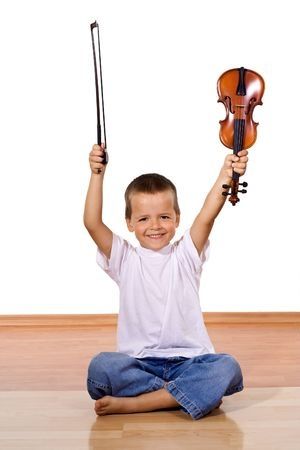Depression
Can a Daily Dose of Mozart Squelch Depression?
A new study links music therapy to happier kids.
Posted November 2, 2014
Recently, a research team at Queen’s University Belfast, Ireland, announced the results of its study on the impact of music therapy on children with mood disorders.
The outlook is sunny.
“In the largest ever study of its kind, the researchers in partnership with the Northern Ireland Music Therapy Trust, found that children who received music therapy had significantly improved self-esteem and significantly reduced depression compared with those who received treatment without music therapy.
The study, which was funded by the Big Lottery fund, also found that those who received music therapy had improved communicative and interactive skills, compared to those who received usual care options alone.”

Readers, does this surprise you? It makes total sense to me. As the mother of two children, one who suffers from severe depression and another who does not, I can see the application of this theory in my own family.
First, let me tell you something about us. We are, by and large, a family of musicians and/or music lovers. In my childhood home (and this was in the days of vinyl and eight-track tapes), music was a constant. We played instruments. We listened (mostly to classical music, although we kids branched out now and again). On rainy Saturdays, I’d sit with my father in the den and he’d show me how following along in the score while we listened to an opera or a string quartet was a different experience than listening by itself.
By the time I was a young adult and living on my own, I had entire operas and symphonies accessible on demand wherever I went. They were embedded deep in my brain--and I dredged them up whenever I needed help slogging through a tough experience.
Like my son, I am a scholar at the School of Hard Knocks. I won’t write much more about my childhood here--I probably will sometime in the future, though, so watch out!--but I endured a lot of trauma from my youngest years through the end of high school and beyond. I have my own disability, Tourette Syndrome, and it’s the kind of thing which, if you grow up at the wrong time and in the wrong place, makes you very, very vulnerable out in the world. If you have a sibling with whom you don’t feel safe, like I did, then you get a double dose of daily stress--inside the house and out of it.
But here’s the thing: as tough, and as anxious, as daily life was for me--and to this day I am working on healing from that childhood trauma and the trauma of raising a child with severe mental illness that came later--I was never seriously depressed. I credit my loving parents, my brother, the animals in my life, books, and MUSIC with keeping me afloat during some pretty difficult times. They all seemed like the only things I had that no one could ever take from me. Especially the music, which would almost certainly live with and in me as long as I was breathing and had my wits about me.
I know what you’re thinking, Readers. If music is so much a part of my life, then how come my second child has been enslaved by the terrible, spirit-sucking sadness that music mostly deflected from me? And how did my older child's experience turn out so different from that of the younger one?
Well, this is a complicated question, and one without clear and simple answers. Every child is unique and has unique experiences, different levels of resilience, circulates among different peers, and so on. However, I do feel there is a fairly simple qualified answer: when I was pregnant with Saskia, I listened to music all the time--and ergo, so did she, in utero. I sometimes thought I felt her kick in perfect time to whatever CD was playing in the car. I sang, too--not well, maybe, but fortunately a mother’s voice is always a thing of beauty to a small child.
Am I crazy to attribute at least part of Saskia's emotional wellness to her immersion in music? Apparently not, according to the good folks in Belfast
After she was born, I kept singing and listening, and she sang and listened with me. She enthusiastically pumped her short little legs while she picked finger foods off her high chair tray, and I said to my husband Lars, “Look, she’s got perfect rhythm! She’s going to be a musician!” (That turned out to be 100% true.)
By the time I was pregnant with Ben, I was as stressed out as I was in school, though for different reasons. It wasn't easy trying to manage a job that made me feel like an imposter, parenting an extremely opinionated baby, and wrestling with our everlasting financial worries. On top of that, I’d also gone through three or four surgeries by my second pregnancy, one of them quite major, and another biggie was looming on the horizon. My body was depleted, and so was my energy.
Somehow, in that time of great stress, music left our home--or we let it go. (And by "we," I mean I, of course. Guilty as charged.) I really have no idea why I dropped the lifeline. What I do know is that Ben did not have the good fortune to be intimately acquaintanced, from the earliest age, with Mendelssohn, and Mozart, and Brahms, and Paul McCartney, and Ella Fitzgerald singing Cole Porter, and Fats Waller, and Simon and Garfunkel--and once in a while, Mick Jagger.
Now, I have no hard evidence that this musical scarcity is what caused his suicidal depression. Nor could I prove, if pressed, that the few bouts of depression I DID experience (after having children) were caused by--or exacerbated by--this loss of music in my life.
In fact, I think human beings, and especially human brains, are far more complex than that argument would allow. And so I will not make it. I don't doubt that Ben and I would have been who we are, even if music had never slipped out of our lives.
Still, I believe music heals inner wounds. Maybe the burdens we hefted would have been lighter if we’d only summoned melody, and harmony, and counterpoint, and the timbres and colors of all kinds of vocal expression, into our lives when we needed them most.
You know, I'm lucky--Saskia has brought music into our house again. Sometimes I stand quietly outside her bedroom door and eavesdrop while she practices her beautiful singing. I have regular performances to look forward to. And I think all this has been part of my long and slow and far-from-complete recovery.

Ben is mostly not at home now. When he is, I notice his pull is toward drawing and sports and computer gaming. Maybe those things are his music. Or maybe the music that heals, for him, is found in birdsong. He loves birds. Yet he does seem to have within him seeds of the music I know and need. He played violin for a few years. He was gifted at it. But the expectations that come with learning an instrument (especially when you have a gift for it) nearly killed him. I’ve been reluctant to bring it up, but recently he reached for his violin and decided he wanted to play again. He is playing at school now. And my job is to just sit back and let him find his joy wherever he can.
When the time is right, I think I’ll ask him to sit down with me and hear Gil Shaham play Bach on YouTube. After all, there is still plenty of healing left for the two of us to do.




